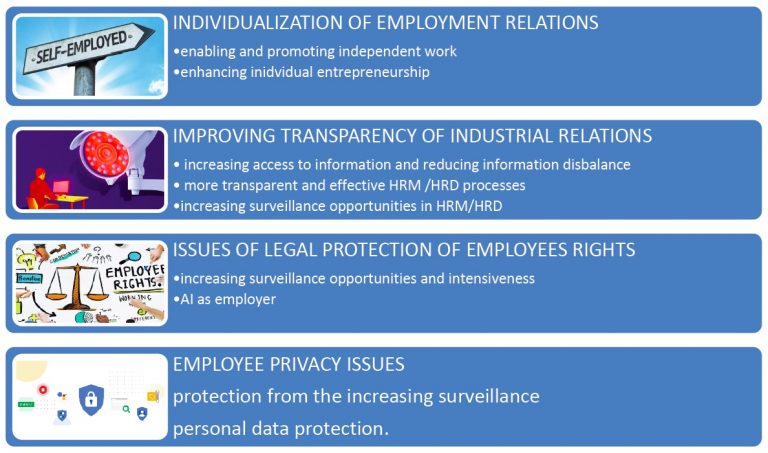2.11 Shaping the Future of Work
AI and industrial relations: how would AI influence design of work and employment?
AI can have rather different implications for the design of jobs and employment.

One of the core implications, outlined by many experts, is strengthening of the individualization of employment and self-employment, when the person, equipped with the AI support will be able to work independently in many occupational fields and sectors, including manufacturing, service provision or administrative work. In this case the individual entrepreneurship would become a very important factor of the successful integration of person in the labour market. According to this scenario AI could contribute to the overhaul of the traditional industrial relations which emerged during the first industrial revolution. People will be less dependent on the enterprises and more capable to shape their employment and work by themselves. This scenario also entails different risks, such as elimination from the labour market and economic participation the parts of population, who face digital exclusion and do not possess sufficient digital skills and competencies, or do not have access to decent educational provision in order to tackle these skill gaps. These trends are illustrated by the audio below:
AI together with Big Data solutions is also expected to influence the transparency of industrial relations by tackling different current dis-balances and mismatches of information used by the employers and employees in strengthening their negotiation power. Availability of the different administrative data and their analysis empowered by the AI will make the processes of recruitment and selection of candidates more smooth and effective, helping the enterprises to deal with the ‘gambling’ strategy of the job applicants seeking to win the competition for jobs by manipulating the information about themselves. These technologies also empower enterprises to increase the surveillance of the employees and to use in seeking to increase the productivity and to shape their working behavior (for example, using Ai for the surveillance and analysis of the e-mails and other communication of employees). It turns into risks of violation of the privacy of persons and their personal freedom both at work and beyond the working life. A good illustration for this is provided here:
AI also influences the labour law: employment protection in face of redundant and emerging workplaces, AI as employer status, worker surveillance issues by using AI, work safety issues when working with the AI enabled technologies and many other issues (clicking the link will forward you to the Coursera website):
Finally, usage of AI in the employment relations is causing a lot of issues of personal privacy which have to be dealt with by involving all relevant stakeholders: employers, employees and state responsible for the legal framework. Watch this video to understand it better:
